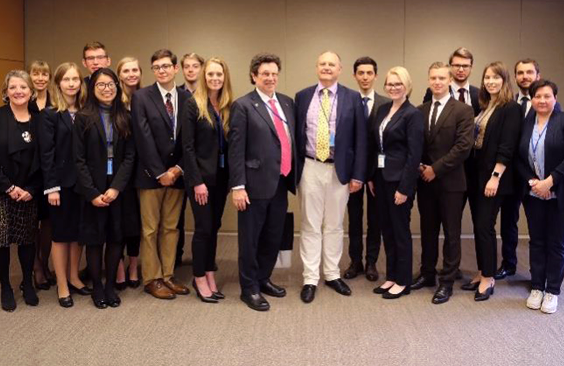June 9, 2020
Sarah Bidgood
On May 15, 2020, the James Martin Center for Nonproliferation Studies and the PIR Center held a virtual US-Russia Dialogue on the NPT Review Process that highlighted ideas from the next generation. This was the third such event in as many years that the two organizations have convened around this topic. The dialogue was supported by the MacArthur Foundation and chaired jointly by CNS Director Professor William Potter and PIR Center Director Dr. Vladimir Orlov. It showcased the recommendations of seven young Russian and American professionals for ways to revive cooperation between Washington and Moscow on issues relating to the NPT.

Screenshot of the US-Russia Track 2020 Conference
While last month’s dialogue was originally scheduled to take place in New York City on the margins of the 2020 NPT Review Conference, the COVID-19 global pandemic forced a change of plans. Following the postponement of the RevCon, Sarah Bidgood, Director of the Eurasia Nonproliferation Program at CNS, worked closely with Yulia Sych, Educational Program Director at the PIR Center, to convert the half-day event into a format that could be delivered online. Despite the significant time difference between Monterey, California and Moscow, Russia, the event drew more than 25 participants from both countries. Attendees included former Russian and US officials, representatives from philanthropic organizations, and alumni of other US-Russia events co-convened by CNS and the PIR Center.
As has been the case in years past, the 2020 dialogue was divided into two sessions. The first examined the history of US-Soviet/Russian cooperation within the NPT and explored how it has changed over fifty years since the treaty’s entry into force. Three speakers shared their original research during this session: Grace Kier, a recent alumna of the College of William and Mary, Nikita Degtyarev, a graduate student in the MIIS-MGIMO Dual Degree MA Program in WMD Nonproliferation, and Sam Whitefield, a graduate student in the MIIS Nonproliferation and Terrorism Studies (NPTS) program. While their presentations touched upon different periods and topics, each highlighted the extent to which interpersonal trust, a shared vision in the importance of nonproliferation, and rapport between individuals were essential to the negotiation and implementation of the NPT.
The second session was forward-looking in focus and explored specific ways to revive US-Russia cooperation within the NPT over the course of the next review cycle. Four students offered analysis and recommendations during this session: Aubrey Means, a MIIS NPTS graduate student, and Jeremy Faust, Sergey Semenov, and Vladislav Chernavskikh, all graduate students in the MIIS-MGIMO Dual Degree program. The presenters highlighted opportunities for the US and Russia to work jointly to advance shared interest across all three pillars of the NPT, as well as in related areas like nuclear risk reduction and export controls. They also identified ways for the US and Russia to make the most of their time in the leadup to the now-delayed RevCon and offered creative proposals to give this significant event a greater chance at success.
Following the two sessions, participants engaged directly with practitioners in a dynamic question-and-answer period. Senior former officials—including Ambassador Susan F. Burk, former Special Representative to the President of the United States for Nuclear Nonproliferation, Dr. Lewis Dunn, former US Ambassador to the NPT Review Conference, and Ms. Anita Friedt, former Acting Assistant Secretary and Senior Advisor to the Under Secretary for Arms Control and International Security at the US Department of State—offered students candid insights from their firsthand experiences in NPT negotiations.
Given that one of objective of this dialogue series is to facilitate the transfer of knowledge from one generation of experts to the next, the organizers were delighted that such an august group of practitioners made themselves available for the full three-hour event. The dialogue’s virtual format, while in some ways less gratifying than an in-person meeting, afforded new ways to engage more, and more diverse, participants, and the result was an unequivocal success.

Participants of the US-Russia Track 2019 Conference
